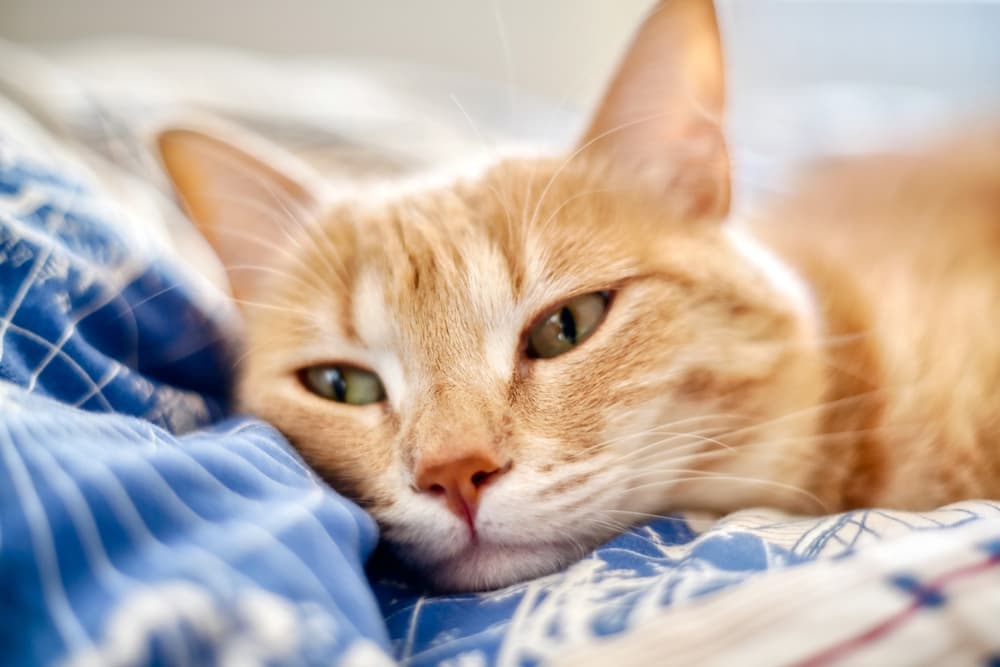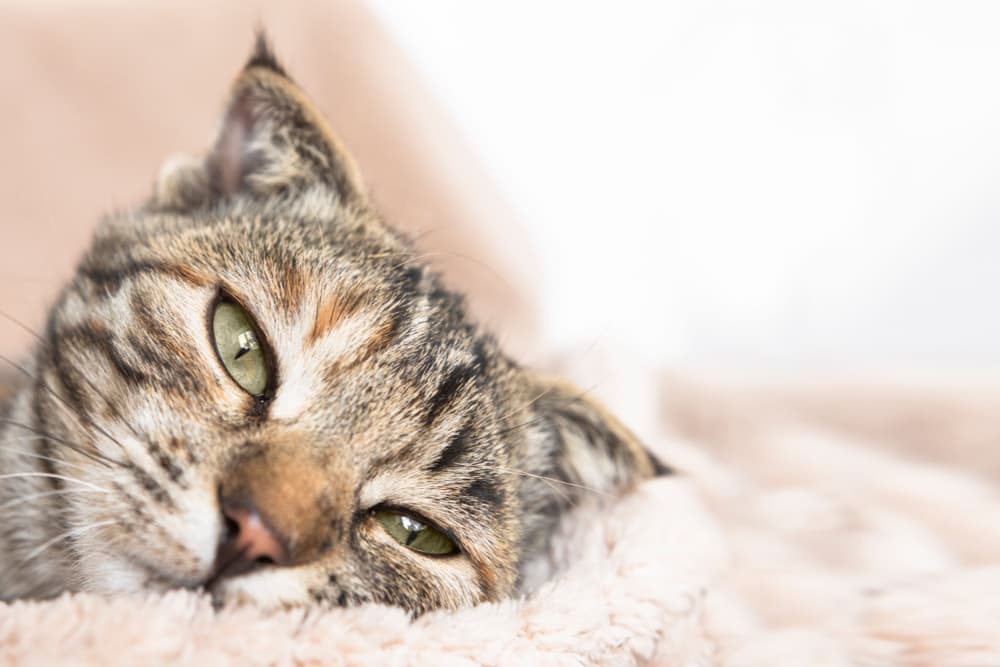Cat Heart Disease: Causes, Symptoms, and Treatment Options

Heart disease is one of the many diseases that our cats have in common with us, although it looks a bit different in our feline companions.
Feline heart disease affects about 15 percent of cats. It is often called the “silent disease,” only making itself known when advanced.
With few exceptions, heart disease in cats is not curable. But, with careful monitoring and management, cats with heart disease can enjoy a good quality of life.
Here’s everything you need to know about cat heart disease.
Cat Heart Anatomy

Understanding the basics of cat heart anatomy and function is a good first step to learning about cat heart disease.
Like the human heart, the cat heart is divided into four chambers: the left and right atria on top and the left and right ventricles on the bottom. A thick wall of muscle called the septa separates the ventricles. A thin, double-walled protective sac called the pericardium encloses the heart.
Heart valves ensure proper blood flow through the heart and then out to the rest of the body. This blood flow is tightly controlled by electrical signals that regulate when the heart contracts (squeezes) and relaxes.
The heart is vital to a cat’s overall health. It must work with perfect efficiency to pump oxygen-rich blood to the brain, lungs, and other organs.
Types of Cat Heart Disease

Heart disease is defined as any disease process that affects normal heart function. The types of cat heart disease are broadly categorized as congenital or acquired.
Congenital Heart Disease in Cats
Congenital heart disease is a heart defect that develops during fetal development. Although some congenital heart diseases are apparent at birth, others may not cause symptoms until later in a cat’s life.
The most common types of congenital heart disease in cats are heart valve malformations, ventricular septal defect (VSD), and patent ductus arteriosus (PDA).
- Heart valve malformations: Heart valve malformations disrupt the normal blood flow through the heart. The most common heart valve malformation in cats involves the mitral valve, which separates the left atrium and left ventricle.
- Ventricular septal defect (VSD): VSD occurs when a hole develops in the septa, leading to abnormal blood flow through the heart.
- Patent ductus arteriosus (PDA): PDA occurs when a blood vessel (ductus arteriosus) that connects the aorta and pulmonary artery during fetal development remains open instead of closing soon after birth. PDA causes an overflow of blood from the heart to the lungs in newborn kittens.
Acquired Heart Disease in Cats
Acquired heart disease occurs later in a cat’s life, typically in adulthood. The most common type of acquired heart disease in cats is cardiomyopathy, a broad term that describes abnormal heart muscle. Three main cardiomyopathies affect cats:
- Hypertrophic cardiomyopathy (HCM): HCM in cats occurs when the ventricle’s muscle wall becomes too thick. It is a genetic disease and the most common form of feline cardiomyopathy.
- Restrictive cardiomyopathy: Restrictive cardiomyopathy occurs when the ventricle’s inner lining becomes scarred, making it hard for the ventricle to contract and relax fully.
- Dilated cardiomyopathy (DCM): DCM is rare in cats. It occurs when the ventricular muscle becomes thin and flaccid, preventing the ventricle from fully contracting and relaxing.
When heart disease becomes so advanced that the heart can no longer pump blood efficiently, congestive heart failure (CHF) develops. CHF is end-stage heart disease. It is life-threatening and requires intensive and potentially aggressive medical treatment.
Causes of Cat Heart Disease

The cause of many cases of heart disease in cats is not known. However, there are a few known causes of feline heart disease.
Congenital heart disease is caused by a heart defect during fetal development that may be genetic.
Underlying medical conditions, including hyperthyroidism, anemia, and high blood pressure, can cause acquired heart disease in cats.
In addition, a deficiency of the amino acid taurine can cause DCM. Taurine deficiencies in cats are uncommon, mainly because commercial cat diets are formulated to contain sufficient taurine for a cat’s dietary needs.
Some cat breeds are genetically predisposed to heart disease. For example, Maine Coon cats, American and British Shorthairs, and Persian cats have a high risk of developing HCM. Siamese cats are predisposed to developing PDA.
Symptoms of Heart Disease in Cats

With feline heart disease, symptoms are often absent until late in the disease process. Some of the symptoms we’ve listed below, such as lethargy and weakness, aren’t specific to heart disease but do signal that something is not quite right.
Sudden collapse and sudden hind limb paralysis warrant an immediate trip to your veterinarian or a veterinary emergency hospital.
- Lethargy
- Weakness
- Pale gums
- Weight loss
- Stunted growth
- Sudden collapse
- Decreased appetite
- Difficult, rapid breathing
- Arrhythmia (abnormal heart rhythm)
- Sudden hind limb paralysis (indicates a blood clot)
Unlike dogs, cats with heart disease do not cough.
Diagnosing Heart Disease in Cats

Diagnosing heart disease in cats involves a physical exam, imaging tests, and various laboratory tests.
On the physical exam, a veterinarian will pay close attention to the heart, listening for a heart murmur (abnormal heart rhythm). Heart murmurs do not always indicate heart disease but may be present with the disease.
Imaging tests include chest X-rays, an electrocardiogram (ECG), and an echocardiogram. Chest X-rays may reveal an enlarged heart, which strongly indicates heart disease. However, an X-ray will not provide information about the type of heart disease.
An ECG assesses the heart rate and rhythm. But, like the X-ray, an ECG does not help diagnose a specific type of heart disease.
An echocardiogram is an ultrasound of the heart. It is the most definitive way to diagnose heart disease. It provides a detailed picture of the heart’s dimensions and muscle wall thickness and measures how well the heart can contract.
Laboratory tests can help identify an underlying cause of the heart disease. For example, blood work may reveal hyperthyroidism or anemia.
A more specific blood test measures NT-proBNP, a protein whose presence in the blood indicates heart disease and the disease’s severity but not the type of heart disease.
Measuring blood pressure helps determine whether high blood pressure could be contributing to a cat’s heart disease.
Cat Heart Disease Treatment

Treatment for heart disease in cats depends on the type and severity of heart disease and its underlying cause.
Besides PDA, which can be treated surgically, treatment for congenital and acquired heart disease is with medication, if necessary. If a cat with heart disease has no symptoms or only mild symptoms, regular monitoring may be all that’s needed until symptoms appear or worsen.
Several types of medications are available to manage heart disease in cats. Here’s a list of those medications and how they work:
- Diuretic: Flushes out excess fluid from the lungs or abdomen
- ACE inhibitor: Relaxes blood vessels and reduces blood pressure
- Pimobendan: Improves heart function by improving contractility
- Blood pressure medication: Lowers blood pressure
- Beta blocker: Slows the heart rate, reduces blood pressure
- Calcium channel blocker: Slows the heart rate, helps the heart pump more efficiently, reduces blood pressure
Prognosis for Cats with Heart Disease
The prognosis for cats with heart disease will depend on the type and severity of heart disease. Kittens with severe congenital heart disease will have a poor prognosis. The prognosis is better with mild heart disease.
How to Prevent Heart Disease in Cats
Heart disease in cats cannot be prevented. However, regular wellness visits can help your veterinarian detect heart disease early and develop a management plan to slow disease progression and, as much as possible, maintain a good quality of life for your cat.









